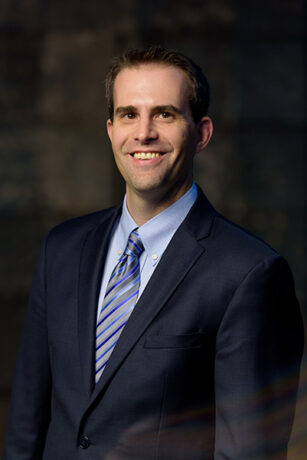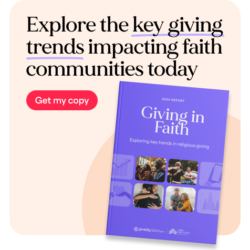The Power of Practices: Religious and Spiritual Activities Are Vital to Giving and Volunteering
The Power of Practices: Religious and Spiritual Activities Are Vital to Giving and Volunteering
by David P. King, PhD
From our ongoing research at Lake Institute, we know that religion is one of the strongest predictors of giving and volunteering. Religious Americans are more likely to give and volunteer, and to do so more often and in higher amounts both to religious and secular causes. Yet, we also know that the religious landscape is changing. Religious affiliation, attendance, and membership in U.S. religious institutions are decreasing, even as the percentage of people who identify as spiritual but not religious is increasing (22%). These two trends – the weakening of organized religion and the movement toward spirituality – leave us with some pressing questions: what exactly is changing, how, and what do these trends mean for leaders and fundraisers in religious organizations? Building off recently published research by scholars at the Lilly Family School of Philanthropy may help us to make greater sense of how to assess these trends.
Defining “spiritual” and “religious”
To address these questions, though, we need to note the difficulty in distinguishing categories such as religious and spiritual. Too often, “spiritual” has been defined in contrast to “religious.” It may be clearer to say that spirituality best describes beliefs and activities that focus on individual-level experiences connected to the sacred, in contrast to religion’s ties to the communal or institutional level. Yet, spirituality does not simply describe the therapeutic or “extra-theistic.” In fact, the majority of Americans still define spirituality in theistic terms that loosely associates with organized religion. The largest percentage of Americans (48%) see themselves as both spiritual and religious (Pew, 2023). The categories are, by definition – messy – and it’s most likely the case that the greatest number of faith-based donors identify as both spiritual and religious.
Second, even in expanding our categories, the data points to the fact that religion and spirituality are both strong predictors of giving and volunteering. Yet, we are still left with the question of why and how these connections matter. Looking at some of the constitutive parts of religion and spirituality may help us make sense of the connection and consider how best to respond as both faith and giving are changing.
Belief, belonging, and behavior
Defining religion is never easy, but many have turned to the Three Bs as a general guide: Belief, Behavior, and Belonging. Surveys that ask about religion will often focus on general markers of belief and belonging. A first question will seek to categorize the respondent’s religious affiliation. For example: Would you identify as a Catholic, Protestant, Jew, Muslim, nothing in particular, etc.? Less frequently, surveys might ask if you are a member of a particular house of worship. Thus, having determined you are Catholic, a follow-up might be whether you belong to a specific parish. A third common question gets to issues of salience or importance. For instance: How important is your religious/spiritual identity in your daily life? Two individuals may both be Catholic, and even belong to the same local parish, but they may differ in the significance and role that faith plays in their life.
In predicting giving and volunteering, belief and belonging matter. One of the biggest predictors of giving and volunteering is maintaining a religious affiliation. In fact, the difference between those who identify with a religious tradition and those who do not is much more significant than differences across traditions (e.g. Catholics or Protestants, Jews or Muslims). This is key, since the number of people now religiously unaffiliated is growing. Membership in a specific religious or spiritual community is also a major factor in giving and serving. In addition to having a particular religious identity, it matters that an individual also has a connection to a particular faith community.
Beyond these questions of belief and belonging, however, behavior is another important aspect of religious and spiritual activity. The most often tracked behavior in surveys is attendance at religious services. We know attendance is an important measure associated with giving and volunteering, but it is also the case that it may prove less significant after taking other activities into consideration. Additional activities beyond worship attendance (such as participating in a small group, teaching children or youth, singing in a choir, or joining a meditation group) may be an even better predictor of giving and volunteering.
Vital role of multiple religious and spiritual practices
What about other religious and spiritual activities that are not tied to specific communities? While ushering or volunteering in the nursery matters for giving and serving, recent research has also tested other spiritual activities such as prayer, reading sacred texts, yoga, meditation, and spending time in nature that need not be practiced with others. It turns out that almost all of these religious/spiritual practices also matter, and they often have effects somewhat similar to attending religious/spiritual services. There’s a lot we still do not know, but it’s clear that these religious/spiritual practices are significant. It is also clear that spiritual activities are more additive than distinct from religion. At present, people who identify as spiritual and religious are more likely to give and volunteer than the spiritual or religious and the spiritual and not religious.
These new studies leave us with more questions than answers. We know that religious/spiritual practices matter, but we are less clear whether these private practices matter as much as public, participatory ones. We are also unclear about the cause and effect. Do these spiritual and religious practices lead to increased giving and volunteering, or perhaps is giving and volunteering a spiritual/religious practice that drives other practices as well?
Takeaways for faith leaders
Even as the research generates new questions, it illuminates key points for religious leaders who are focused on fundraising and nurturing generosity in their communities. First, it underscores the complexities of religious and spiritual life in our contemporary context that leaders cannot afford to overlook. Second, while belief and belonging still matter, perhaps our current major focus should be on behavior. What are the religious and spiritual practices that we can encourage that are intertwined with giving and volunteering? Finally, for all religious leaders, it is worth expanding our imaginations as to the locus of meaning-making in the lives of those entrusted to our care.
As Wendy Cadge and Elan Babchuck wrote in the Atlantic:
“[R]ather than asking how many people went to church last Sunday morning, we should ask, ‘Where are Americans finding meaning in their lives? How are they marking the passing of sacred time? Where are they building pockets of vibrant communities? And what are they doing to answer the prophetic call, however it is that they hear it?”
Both belonging to a religious and spiritual community and engaging in a broad set of religious and spiritual practices continue to be strong predictors of giving and volunteering. As our religious and spiritual identities evolve and our forms of community change, it is vital to continue to attend to the ways that belief, belonging, and behavior shape our commitments to giving and volunteering. It can be difficult for faith leaders to address these topics directly, but they are ripe for further exploration and deserve engagement and attention. Faith and giving are changing, but there is much we can learn and do to shape the future funding of our religious and spiritual communities.
Questions for Reflection
- How can we encourage the religious and spiritual practices that spark generosity?
- Where are the people in my community finding meaning in their daily lives?
Expanded Perspective: Further Research on Spirituality
 by David P. King, PhD
by David P. King, PhD
To make sense of the growing interest in spirituality, a number of new studies have sought to extend our knowledge of spirituality beyond religious communities.
Fetzer Institute recently updated a second phase of their study of Spirituality in America that our recent studies of religious and spiritual identities were based on. Their recent report is worth further exploration.
Similarly, Pew Research Center has also fielded a significant national study of spirituality in America.
Alongside these national studies, recent publications by King et al., Steensland et al., and Kucinskas and Stewart have brought the questions of spirituality to bear on the particular issues of spirituality and giving, volunteering, as well as civic engagement.
David P. King is the Karen Lake Buttrey Director of Lake Institute on Faith & Giving as well as Associate Professor of Philanthropic Studies within the Indiana University Lilly Family School of Philanthropy.
Thomas H. Lake Lecture
Lake Institute is excited to welcome renowned scholar of Jewish studies and a present-day leading voice for modeling dialogue across difference, Dr. Susannah Heschel to our 19th Annual Thomas H. Lake Lecture. She will explore how religion broadly and Jewish tradition specifically can help us better practice philanthropy as the love of humanity. Thursday, April 18 at 6 pm ET at the Indiana Historical Society and online.
2024 Giving in Faith Report
 We’re thrilled to announce the release of the third Giving in Faith report, developed in partnership with Givelify’s Philanthropic Research & Insights team. Based on the responses of nearly 3,000 faith leaders and people of faith, this report uncovers key insights into the motivations and community needs driving religious giving and an outlook on future generosity. It also explores the impacts of emerging technologies like artificial intelligence (AI) and language models like ChatGPT are having on congregations and the innovative ways faith leaders are using these tools.
We’re thrilled to announce the release of the third Giving in Faith report, developed in partnership with Givelify’s Philanthropic Research & Insights team. Based on the responses of nearly 3,000 faith leaders and people of faith, this report uncovers key insights into the motivations and community needs driving religious giving and an outlook on future generosity. It also explores the impacts of emerging technologies like artificial intelligence (AI) and language models like ChatGPT are having on congregations and the innovative ways faith leaders are using these tools.
Explore these exclusive insights. Download your free copy of the 2024 report today.
Subscribe
Insights is a bi-weekly e-newsletter for the religious community and fundraisers of faith-based organizations that provides:
- Reflections on important developments in the field of faith and giving
- Recommended books, studies and articles
- Upcoming Lake Institute events


